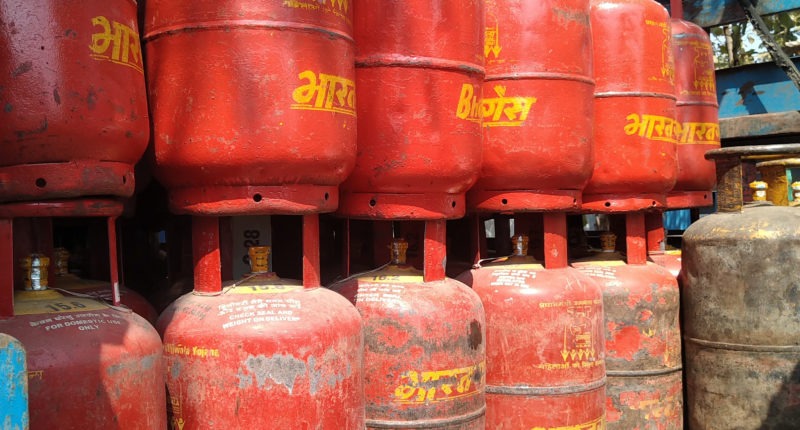Pradhan Mantri Ujjwala Yojana (PMUY) was launched by the Ministry of Petroleum and Natural Gas on 1st May 2016. The government introduced this scheme to be implemented for three years, i.e. the financial year of 2016-2017, 2017-18 and 2018 – 2019. This scheme provides LPG connections to Below Poverty Line (BPL) households. The LPG connections under this scheme are given in the name of the women beneficiaries of the household. Under this scheme, EMI facility is also provided for stove and refill cost.
The government introduced this scheme because most rural households were using fossil fuels to prepare food in India. The rural and BPL households had not availed LPG connections. The usage of fossil fuels affects the health of women of such families. Thus, the government decided to introduce this scheme and provide financial support amounting to Rs.1,600 for each LPG connection given to the rural and BPL families. This scheme provides an incentive for rural households and BPL families to obtain LPG connections.
Aim of PMUY
PMUY aims to provide free LPG connections to all BPL households, thus providing clean fuel for cooking. It frees women from health hazards of using firewood and collecting wood. It also aims to make every household smoke free. The scheme aims to cover five crore women.
Benefits of PMUY
This scheme provides interest-free loans for purchasing a gas stove and refilling the cylinder, and the government bears the administrative cost of every LPG connection. The LPG facilitates clean cooking fuel to BPL and rural households. The LPG prevents health hazards related to indoor air pollution and brings about qualitative changes in living standards. By providing LPG connections to BPL and rural households, the government will ensure universal cooking gas coverage in India.
Implementation of PMUY
At the time of launch of PMUY, the government targeted to cover five crore BPL households to provide deposit free LPG connections by 31st March 2019. The government achieved the initial target of 5 crore BPL households after just 28 months of its launch. In August 2018, around 47% of the beneficiaries were from the weaker sections of the society (SC/STs), as per the government’s data. The states of Uttar Pradesh (87 lakh), Bihar (61 lakh), West Bengal (67 lakh), Odisha (30 lakh), Madhya Pradesh (45 lakh) and Rajasthan (37 lakh) accounted for 65% of the total connections.
Since the government achieved five crore target, there was an increase of target to eight crore households. A budgetary allocation of Rs.12,800 crore was provided in 2018, to achieve the increased eight crore target. The government reached the target of eight crore by 7th September 2019.
Also Read: Pre-Budget Memorandum: Industry Body Asks to Bring Natural Gas under GST Ambit
Beneficiaries Under PMUY
Women belonging to BPL households, who do not have an LPG connection will qualify to be beneficiaries under this scheme. However, they should be included in the Socio-Economic Caste Census (SECC) 2011 list or under the seven identified categories. These seven identified categories are – Tea and Ex-Tea Garden Tribes, Pradhan Mantri Awas Yojana (Gramin) beneficiaries, Antyodaya Anna Yojana beneficiaries, SC/ST households, people residing in river islands, Forest dwellers and Most Backward Classes (MBC).
Progress of PMUY
Initially, PMUY was launched by the government to be valid till 2019. The government set out the target for this scheme to be eight crore, and they reached this within 2019. There was no continuation of this scheme beyond 2019. But to combat COVID-19 crisis, in March 2020, the government announced that the PMUY beneficiaries would receive refills of up to three cylinders of 14.2 kg from April to June 2020 under the Pradhan Mantri Garib Kalyan Yojana scheme. The PMUY beneficiaries will also receive an advance of the retail selling price.
The Oil Marketing Companies (OMC) will transfer the retail selling price to the PMUY customer’s bank account. The PMUY customers can withdraw the retail selling price to obtain refill from the distributor. This benefit was valid till 30th September 2020. The Indian Oil Corporation Ltd provided more than 11 lakh free LPG in Maharashtra to the PMUY beneficiaries under the Pradhan Mantri Garib Kalyan Yojana scheme in April.
According to the data given by the Ministry of Petroleum and Natural Gas, the OMC’s transferred a free refill advance of Rs.296 crore to the PMUY beneficiaries in Maharashtra. There were 13 lakh bookings for refill and delivery of 11 lakh cylinders in Maharashtra in April.
The state-run oil retailers issued a circular in June stating that the beneficiaries who have received payment for a refill for April and May will have to pay for the third cylinder’s refill. The OMC, however, noted that they would reimburse the amount of refill of the third cylinder after there is a reflection of confirmation of the LPG distribution on its portal.
In June, as per reports, there was a distribution of only 42% of the cylinders. But, there should have been a distribution of around 240 cylinders in three months. The government had provided three cylinders as part of Pradhan Mantri Garib Kalyan Yojana to PMUY beneficiaries to be valid till 30th June 2020. On 6th July 2020, the government announced that the beneficiaries of PMUY who are poor women could avail the unclaimed three LPG cylinders till 30th September 2020.
The government gave the extension till September to help the beneficiaries cope with the economic difficulties caused by the country’s lockdown. Plus, all the beneficiaries could not avail three cylinders’ quota since many rural or BPL households do not consume one full cylinder in one month. The government gave the extension to the beneficiaries who were provided credit for a refill but could not purchase a refill due to various reasons. Under this scheme, there was more than ten crore LPG supply to the poor households between April and June.
Need for an Extension
The government launched the PMUY to provide LPG cylinder connections to the rural household and make India kerosene free. The rustic and BPL homes use fossil fuels for cooking which is dangerous. The World Health Organisation (WHO) recognised this scheme as the Government of India’s decisive intervention. The WHO praised India’s Government for addressing indoor air pollution through this scheme, which accounts for nearly 10 lakh deaths in the country in a year.
The government introduced this scheme to be implemented over three years, i.e. 2016 to 2019 and allocated Rs.8,000 crore totally to implement it. The government also used the money saved from the ‘Give it up’ subsidy campaign for this scheme. There was no extension of this scheme beyond 2019. With the achievement of 5 crore households target in 2018, there was an increase in target to 8 crore households. The government achieved the eight crore households target in 2019.
The scheme ended in 2019 though there was no formal declaration. The official website of this scheme became inoperative. Only three states, i.e. Haryana, Andhra Pradesh and Punjab and five UT were declared kerosene free. However, the government announced that three LPG cylinders refills would be provided to this scheme’s beneficiaries from April 2020 to June 2020 due to the COVID-19 outbreak. There was an extension of this benefit provided to the beneficiaries till September 2020.
Though there was no extension of this scheme, the government provided the benefits under this scheme from April 2020 till September 2020. There was an expectation of extension of this scheme. But, there was no extension of PMUY or the benefits of refill provided to the beneficiaries beyond September 2020.
PMUY benefits rural and BPL households and women in the country. It helps in reducing indoor air pollution. It prevents grave illness and infant death due to pollution and smoke at home. There are around millions of households in India under the BPL category. As compared to the millions of BPL households, the target of 8 crore is very minimal.
A WHO report states that around 4.3 million deaths were because of household air pollution. Use of fossil fuels for cooking causes indoor air pollution and affects health. The fossil fuels used for cooking at homes affect the women who cook and the whole household members. Due to all these circumstances, it is necessary to extend this scheme and provide free LPG to more BPL households who do not have LPG connections at home.
The Parliamentary Committee on Petroleum was upset with the end of this scheme. Before the pandemic outbreak, a report was put forth in the Parliament in March 2020 to extend this scheme to the urban and semi-urban slum areas for covering more households under this scheme. But, there is no news of the extension of this scheme by the government to date. The government has launched various other schemes but has not considered the extension of this scheme. The PMUY is one such social welfare scheme that requires an extension to benefit rural and urban poor and BPL households.
The government needs to consider extending this scheme to the urban and semi-urban poor households. Not all BPL families were covered under this scheme during the three years of this scheme. The government needs to cover the left out BPL households during the scheme’s implementation previously by extending this scheme. This scheme improves the quality of homes of people. It will result in providing clean air and ease in cooking for the poor and urban slum households. Thus, there is a requirement for the government to give a second thought on the extension of this scheme.
For any clarifications/feedback on the topic, please contact the writer at mayashree.acharya@cleartax.in

I am an Advocate by profession. I interpret laws and put them in simple words. I love to explore and try new things in life.





